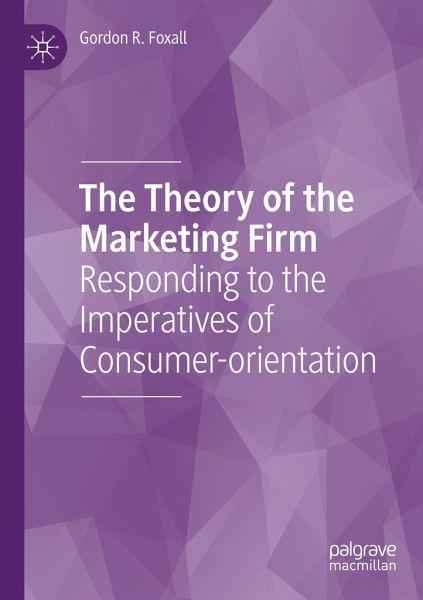
The Theory of the Marketing Firm
Responding to the Imperatives of Consumer-orientation
Versandkostenfrei!
Versandfertig in 6-10 Tagen
106,99 €
inkl. MwSt.
Weitere Ausgaben:

PAYBACK Punkte
53 °P sammeln!
The marketing firm is that business organisation which responds to the imperatives of consumer-orientation. Its style of management is marked by its adherence to the criteria of goal separation, participation in marketing transactions, entrepreneurial sovereignty and reciprocal entrepreneurial management, all of which are explored in this pioneering book. It assumes the proposition, uncontroversial enough to marketing academics and students, that contemporary firms can survive and prosper - achieve their financial goal, be it the maximization of profit or sales or growth - only if they respond...
The marketing firm is that business organisation which responds to the imperatives of consumer-orientation. Its style of management is marked by its adherence to the criteria of goal separation, participation in marketing transactions, entrepreneurial sovereignty and reciprocal entrepreneurial management, all of which are explored in this pioneering book. It assumes the proposition, uncontroversial enough to marketing academics and students, that contemporary firms can survive and prosper - achieve their financial goal, be it the maximization of profit or sales or growth - only if they respond appropriately to those imperatives: specifically, the forces that promote consumer discretion and consumer sophistication. Surprisingly, however, theories of the firm, based on economics, strategic management or behavioural science, show scant recognition of this observation which is abundantly clear from the most elementary treatment of marketing management. Renowned scholar Gordon R. Foxall argues that this proposition should form the starting point of a theory of the firm and explores its implications for marketing theory in the light of the findings of consumer behaviour analysis and research on the marketing firm. Hence, while pursuing a competence theory of the marketing firm based on the idealised implications of the imperatives of consumer-orientation, the book rests its conception on a groundwork of empirical evidence on consumer behaviour and corporate action.














